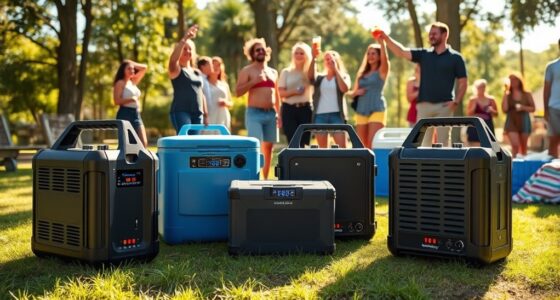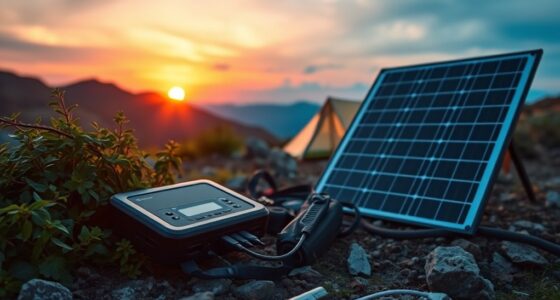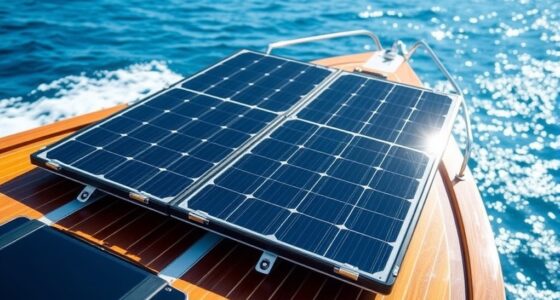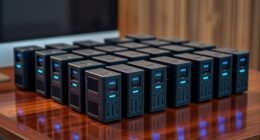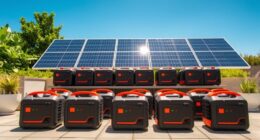If you’re looking for reliable portable power stations for home backup in 2025, I recommend options like the Jackery Explorer 1000, EF ECOFLOW Delta Pro, and AFERIY P210, which offer high capacities, fast recharging, and durable Lithium Iron Phosphate batteries. Smaller units like the Jackery Explorer 300 and portable options with solar compatibility also work well for short-term needs. To find the perfect fit, consider power output, battery life, and portability, and you’ll discover some great choices to guarantee you’re prepared.
Key Takeaways
- High-capacity power stations like EF ECOFLOW DELTA Pro and Jackery Explorer 2000 v2 offer reliable long-term backup for home appliances.
- Advanced battery technologies such as LiFePO4 ensure durability and over 3,000 charge cycles for extended dependability.
- Fast recharging options, including solar and AC, enable quick setup and continuous power during outages.
- Multiple output ports and pure sine wave technology support various household devices safely and efficiently.
- Rugged, portable designs with safety features make these units suitable for reliable home backup in 2025.
AFERIY P210 Portable Power Station (2400W, 2048Wh) with Solar & AC Charging
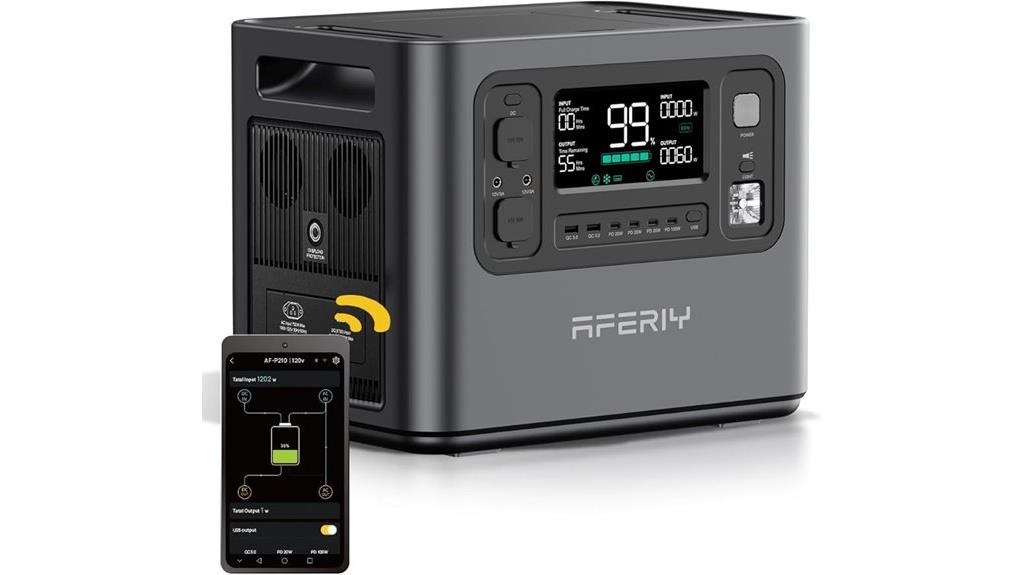
If you’re looking for a reliable portable power solution that can handle multiple devices and provide long-lasting energy, the AFERIY P210 Portable Power Station is an excellent choice. It features a robust 2400W inverter and a 2048Wh LiFePO4 battery with over 3500 cycles, ensuring a decade of dependable outdoor power. Its compact, lightweight design (48.5 lbs) makes it easy to transport. Supporting both solar and AC charging, it offers flexible recharging options. With multiple ports—AC, USB, Type-C, DC—plus a server-level UPS, it’s perfect for backup power, camping, or emergencies. Its quiet operation and smart app controls make it a versatile, user-friendly device.
Best For: outdoor enthusiasts, emergency preparedness, and professionals needing reliable portable power for multiple devices and long-term use.
Pros:
- High-capacity 2048Wh LiFePO4 battery with over 3500 cycles ensures durability and long lifespan
- Supports both solar (500W) and AC (1100W) charging for flexible recharging options
- Multiple output ports including AC, USB, Type-C, and DC, plus server-level UPS for seamless backup
Cons:
- Heavier at 48.5 lbs (22 kg), which may impact portability for some users
- Higher upfront cost compared to smaller or less feature-rich portable power stations
- Requires careful handling and setup due to multiple connection options and large capacity
Portable Power Station 56000mAh, 179.2Wh LiFePO4 Battery Backup
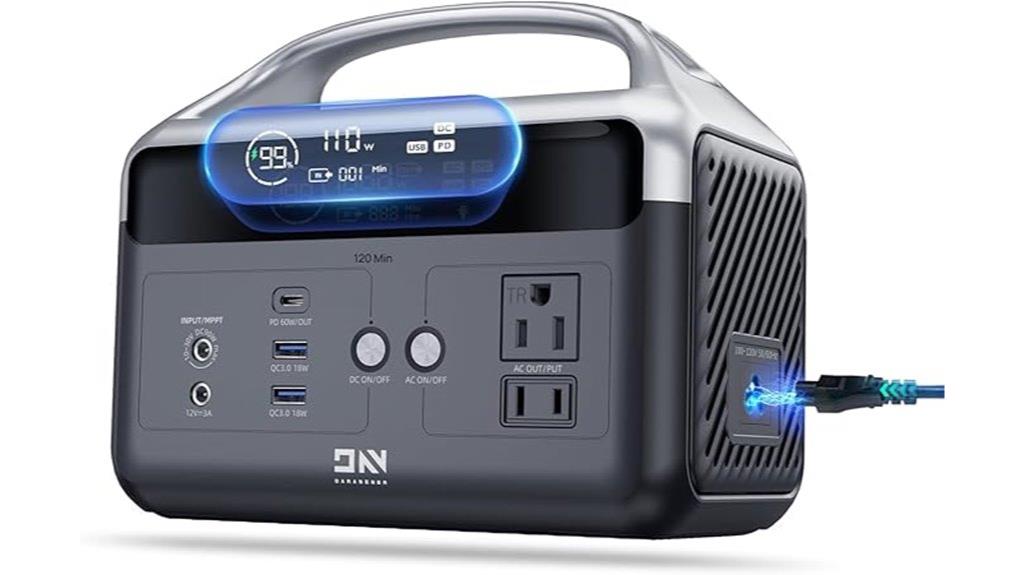
The Portable Power Station 56000mAh, 179.2Wh LiFePO4 Battery Backup is an ideal choice for outdoor enthusiasts and emergency preparedness, thanks to its compact size and versatile charging options. Weighing just 6.2 pounds, it’s smaller than a toaster but packed with power. It features 7 ports, including 3 input and 4 output options, supporting devices under 300W like laptops, phones, lights, and small appliances. With a pure sine wave inverter delivering 300W continuous power and fast charging via AC, car, or solar, it’s reliable and safe, thanks to advanced battery management and over 3500 charge cycles. A perfect portable backup for any situation.
Best For: outdoor enthusiasts, emergency preppers, and anyone needing portable, reliable power for devices under 300W during outdoor trips, camping, or power outages.
Pros:
- Compact and lightweight design (6.2 lbs), easy to carry and store
- Multiple fast charging options including AC, car, and solar panel
- Safe and durable LiFePO4 battery with over 3500 charge cycles and built-in safety features
Cons:
- Limited to devices under 300W, not suitable for high-power appliances
- Only 179.2Wh capacity, which may require frequent recharging for extended use
- Solar charging depends on sunlight availability and max 90W input, potentially slow in cloudy conditions
EF ECOFLOW Solar Generator DELTA2 with 220W Solar Panel

Designed for outdoor enthusiasts and emergency preparedness, the EF ECOFLOW Solar Generator DELTA2 with its 1024Wh LiFePO4 battery and 1800W continuous power output stands out as a versatile and durable portable power solution. It can power most household appliances, including refrigerators and microwaves, thanks to its extensive 15 outlets and 2700W surge capacity. The unit charges quickly via AC in about 80 minutes and supports solar input up to 500W with a 220W bifacial solar panel, capturing up to 25% more energy. Its long-lasting battery, rated for over 3000 cycles, guarantees reliable performance for years of outdoor or backup use.
Best For: outdoor enthusiasts, RV travelers, and emergency preparedness individuals seeking a reliable, long-lasting portable power source.
Pros:
- Long-lasting LiFePO4 battery with over 3000 cycles for durable, reliable performance
- Rapid charging via AC in approximately 80 minutes with support for solar input up to 500W
- Versatile power options with 15 outlets including USB, AC, and 12V ports, capable of powering most household appliances
Cons:
- Hefty weight of 58 pounds may require assistance for transport
- Higher initial investment compared to traditional portable generators
- Limited solar input capacity at 500W, which may extend recharge times in low sunlight conditions
Jackery Portable Power Station Explorer 300
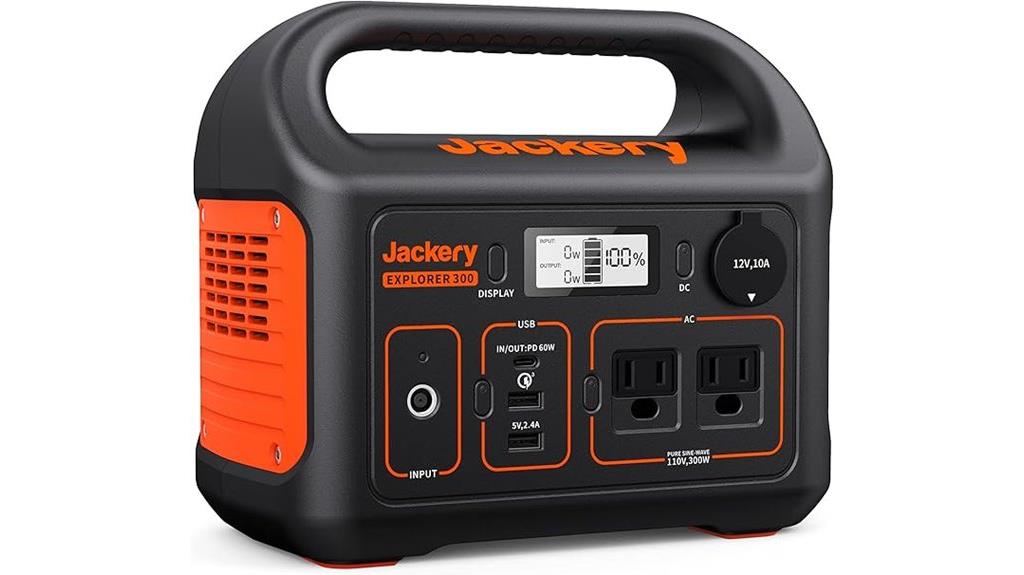
For outdoor enthusiasts and travelers seeking reliable power on the go, the Jackery Explorer 300 offers an excellent balance of portability and performance. Weighing just 7.1 pounds, it features a 293Wh lithium-ion battery and provides stable power with 300W pure sine wave AC outlets. It can power up to six devices simultaneously, including laptops, phones, and small appliances. With multiple charging options—wall, car, or solar—it recharges efficiently, supporting quick power-ups. Its durable, child-safe design makes it ideal for camping, emergencies, or outdoor adventures. Overall, the Explorer 300 combines lightweight convenience with dependable performance, making it a versatile portable power solution.
Best For: outdoor enthusiasts, travelers, and emergency preppers seeking a lightweight, reliable portable power source for small devices and appliances.
Pros:
- Compact and lightweight design weighing only 7.1 pounds for easy portability
- Multiple output ports including AC, USB-C, USB-A, and DC for versatile device charging
- Supports fast recharging via wall, car, or solar, with efficient solar input through MPPT controller
Cons:
- Takes several hours (up to 4 hours) to fully recharge from AC power
- Cannot power high-demand appliances like induction cooktops or blenders
- High-power devices like tire inflators are limited at high charge levels (>50%)
AFERIY P210 Portable Power Station (2400W, 2048Wh LiFePO4 Battery)
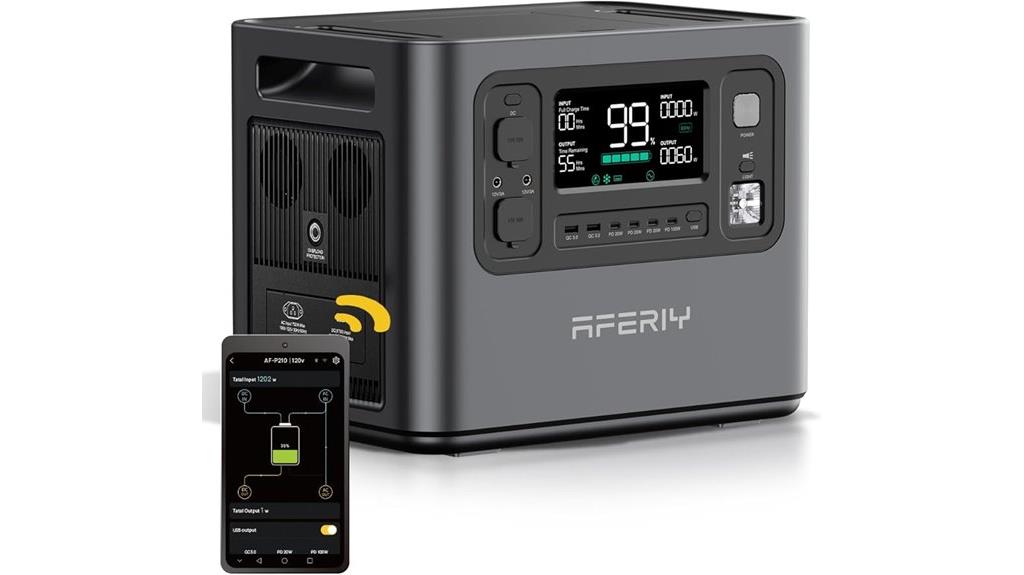
Looking for a reliable portable power solution that can handle your most demanding outdoor activities or emergency needs? The AFERIY P210 offers a robust 2400W inverter with a 2048Wh LiFePO4 battery, providing over 3500+ cycles for a decade of dependable outdoor energy. It’s 20% lighter at just 48.5 lbs, making it easy to transport. It supports up to 16 devices simultaneously through multiple ports, including AC, USB, Type-C, and DC outputs. With a seamless UPS system, quiet operation, and versatile charging options—solar or AC—it’s perfect for backup power, camping, and sensitive electronics. Plus, industry-leading support and a 7-year warranty guarantee peace of mind.
Best For: outdoor enthusiasts, emergency preparedness, and anyone needing reliable portable power for sensitive electronics.
Pros:
- High-capacity 2048Wh LiFePO4 battery with over 3500+ cycle life ensures long-term reliability
- Supports up to 16 devices simultaneously through multiple versatile ports (AC, USB, Type-C, DC)
- Quiet operation (<30 dB at full load) with seamless UPS backup and app-controlled management
Cons:
- Weighs 48.5 lbs, which may be heavy for some portable uses despite being 20% lighter than similar models
- Limited solar input capacity at 500W, which may slow recharge times in off-grid situations
- Higher upfront cost due to advanced features and industry-leading warranty
Jackery Explorer 1000 v2 Portable Power Station
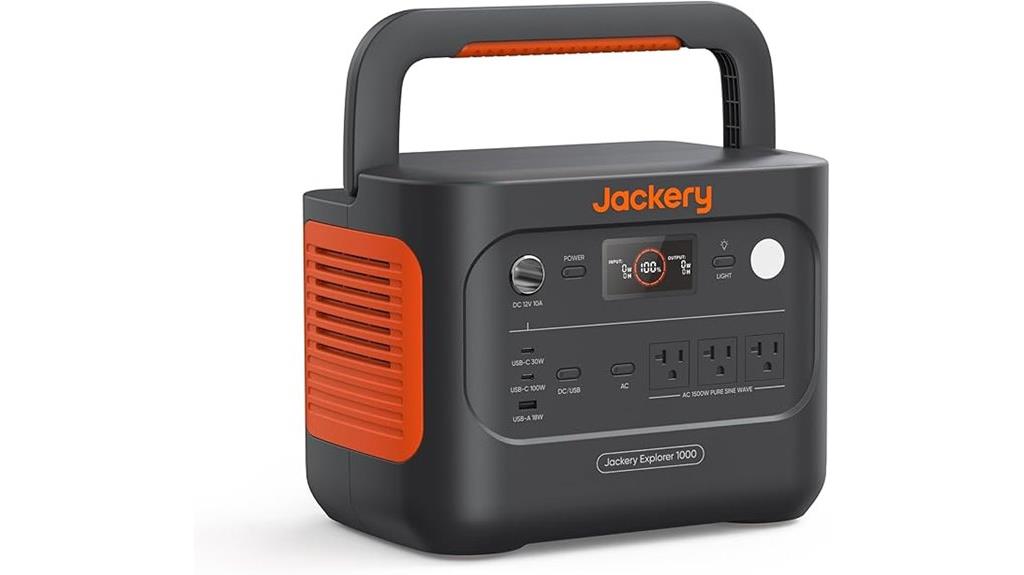
If you need reliable power on the go, the Jackery Explorer 1000 v2 stands out with its impressive 1,070Wh LiFePO4 battery and 1,500W AC output, making it perfect for outdoor enthusiasts and emergency preparedness. It can power appliances like fridges, AC units, and electric pots, and features multiple ports, including USB-C, USB-A, and AC outlets. Weighing only 23.8 pounds with a foldable handle, it’s highly portable. Fast charging from 0 to 100% in just an hour via emergency mode, plus advanced safety tech, guarantees quick, safe, and long-lasting performance—designed for off-grid living and emergencies.
Best For: outdoor enthusiasts, campers, and emergency preppers seeking a reliable, portable power source with fast charging capabilities.
Pros:
- High-capacity 1,070Wh LiFePO4 battery with over 4,000 charge cycles for long-term durability
- Multiple outlets including USB-C, USB-A, and AC for versatile device charging
- Fast one-hour charging via emergency mode with the Jackery App, ensuring quick power replenishment
Cons:
- Compatible only with Jackery solar panels for solar recharging, limiting flexibility
- Delivery restricted to PO boxes, which may be inconvenient for some users
- Relatively heavy at 23.8 pounds despite its portability features
Portable Power Station 300W with Solar Generator and Accessories

The Portable Power Station 300W with Solar Generator and Accessories is an excellent choice for outdoor enthusiasts and emergency preparedness, thanks to its versatile solar charging capability and lightweight design. With a 296Wh battery and 300W continuous power, it can run devices like mini-fridges, laptops, and lights, supporting up to 600W. Weighing just 7.1 pounds, it’s easy to carry with its built-in handle and detachable strap. It features multiple ports—including USB-C, USB-A, and AC outlets—so you can charge up to seven devices simultaneously. Its safety features, durable build, and 360° camping lighting make it reliable for both outdoor adventures and home backup during emergencies.
Best For: outdoor enthusiasts, emergency preppers, and travelers seeking a lightweight, versatile power source to run multiple devices and support solar charging.
Pros:
- Compact and lightweight at only 7.1 pounds for easy portability
- Multiple charging ports including USB-C PD, USB-A, and AC outlets support up to 7 devices simultaneously
- Built-in 360° camping lighting with multiple modes and high-intensity LED for versatile illumination
Cons:
- 296Wh battery may be limited for longer or high-power device use without recharging
- Supports up to 600W total, which may not be enough for larger appliances or high-wattage tools
- Limited to a 3-year warranty, which is standard but shorter than some premium alternatives
EF ECOFLOW Solar Generator DELTA Pro with 400W Solar Panel
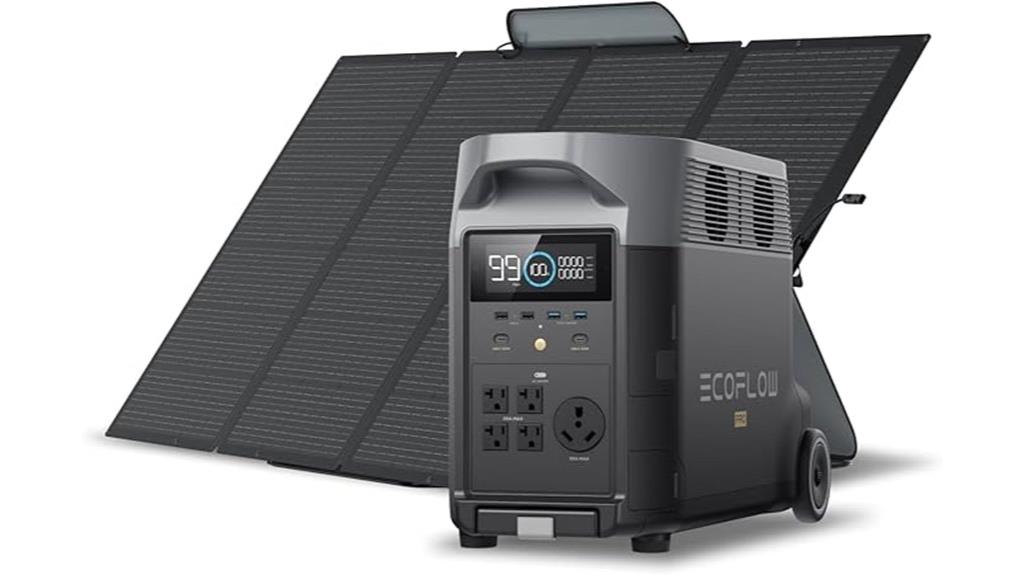
The EF ECOFLOW Solar Generator DELTA Pro with 400W Solar Panel is ideal for anyone who needs reliable, high-capacity power on the go or during outages. With a 3600Wh battery and 3600W AC output, it can handle most home appliances using X-Boost technology for up to 4500W. The 400W solar panel fully recharges the system in about 11 hours, and three panels cut that to approximately 3.5 hours. Its foldable, IP68 waterproof design makes it portable and durable, perfect for outdoor use. The system offers 15 versatile outlets and Wi-Fi control via the EcoFlow app, ensuring convenience and flexibility.
Best For: outdoor enthusiasts, emergency preparedness, and homeowners seeking versatile, high-capacity portable power solutions.
Pros:
- High 3600Wh battery capacity with 3600W AC output and X-Boost technology for up to 4500W power handling
- Fast solar recharging with 400W panels, fully recharging in approximately 11 hours (or 3.5 hours with three panels)
- Durable, portable, and waterproof foldable design with 15 versatile outlets for multiple device charging options
Cons:
- System and solar panels are shipped separately, requiring patience for full setup
- Heavier weight (16kg/35.3lbs) may be less convenient for frequent transport
- Higher initial investment compared to smaller or less capable portable power options
Jackery Explorer 2000 v2 Portable Power Station (2042Wh, 2200W, USB-C PD 100W)
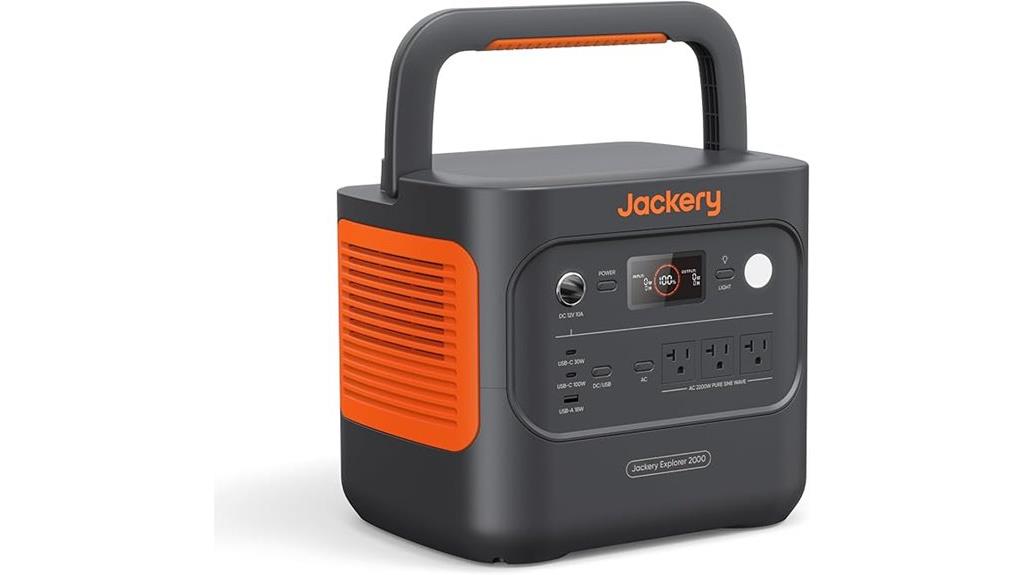
For anyone seeking reliable, high-capacity portable power, the Jackery Explorer 2000 v2 stands out with its massive 2042Wh LiFePO4 battery and 2200W continuous output. It’s ideal for home backup, outdoor adventures, or small business use, supporting essential appliances like refrigerators and sump pumps with seamless UPS switching. The device features a USB-C PD 100W port for fast charging and pass-through capability, letting you power devices while recharging. Weighing only 39.5 pounds and compact in size, it combines durability, quiet operation, and smart temperature control. Its user-friendly LCD and app make monitoring easy, making it a dependable, versatile power solution.
Best For: those seeking a reliable, high-capacity portable power station for home backup, outdoor adventures, or small business use with fast charging and long-term durability.
Pros:
- High-capacity 2042Wh LiFePO4 battery with 2200W continuous power output
- Compact, lightweight design at 39.5 pounds with durable construction
- Supports fast charging (80% in 66 minutes), solar input, and pass-through charging for versatile use
Cons:
- Still relatively heavy for some portable applications despite being lighter than similar units
- Higher upfront cost, though often discounted during sales periods
- Limited to a 20ms seamless UPS switch, which may not suit all critical power needs
Portable Power Station 300W with Solar Generator
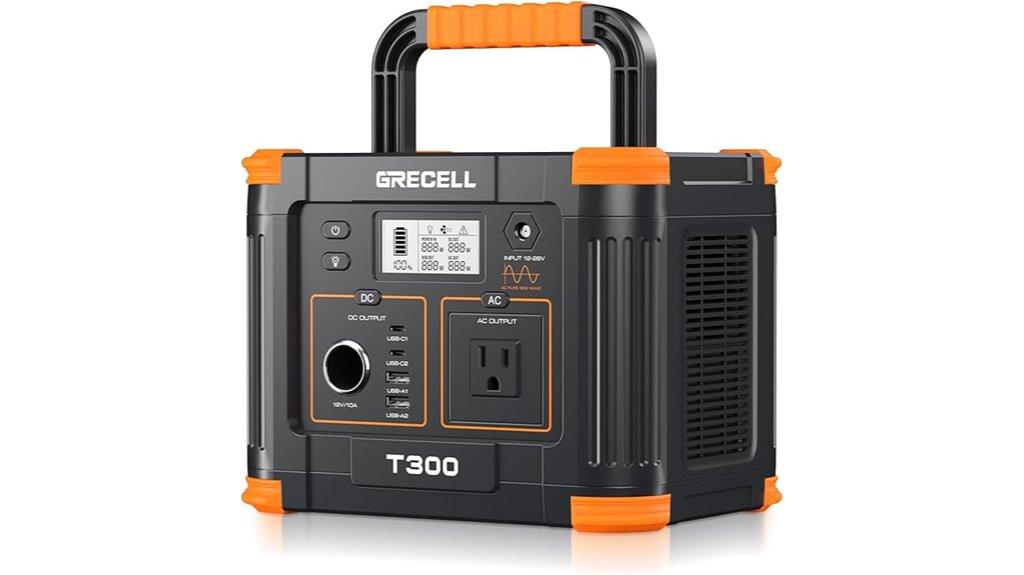
If you’re looking for a reliable portable power solution that’s perfect for outdoor adventures or emergency backup, the GRECELL Portable Power Station 300W with Solar Generator stands out. It offers 230.88Wh capacity, supporting devices under 330W with a peak of 600W, making it suitable for laptops, lights, fans, and small appliances. Its compact design (7.3 pounds) and multiple charging options—AC, solar with MPPT, and car—make it versatile. Six outlets, including fast-charging USB-C ports, let you power six devices simultaneously. Built-in BMS and quiet cooling fans guarantee safety and durability, making it a dependable choice for on-the-go or emergency use.
Best For: outdoor enthusiasts, emergency preparedness, and travelers seeking a reliable portable power source for small appliances and charging devices.
Pros:
- Compact and lightweight design (7.3 pounds) for easy portability
- Multiple charging options including AC, solar via MPPT, and car outlet for versatile recharging
- Supports six devices simultaneously with fast-charging USB-C ports and a total output of 300W (peak 600W)
Cons:
- AC and car ports are located on the sides, which may require modifications for optimal access
- Limited capacity (230.88Wh) may not power larger appliances for extended periods
- Only supports devices rated under 330W, limiting use with higher-wattage equipment
EF ECOFLOW Solar Generator DELTA 3 Plus with 220W Bifacial Solar Panel

With a 1024Wh capacity and 2400W output, the EF ECOFLOW Delta 3 Plus stands out as an ideal choice for those needing reliable power on the go, whether during camping trips, home backups, or emergency situations. It supports five fast-charging methods, including solar, AC, and alternator, with a high solar input of 1000W using its dual MPPT ports. The included 220W bifacial solar panel captures up to 28% more energy by adjusting between 30-60°. Powered by durable LiFePO4 cells, it offers a 10-year lifespan and features versatile ports, an improved display, and quiet operation—making it a versatile, reliable power solution.
Best For: outdoor enthusiasts, homeowners seeking reliable backup power, and campers needing versatile, durable energy solutions.
Pros:
- High capacity of 1024Wh with 2400W output supports multiple appliances simultaneously.
- Fast charging options including solar, AC, and alternator, with a high solar input of 1000W via dual MPPT ports.
- Durable LiFePO4 batteries with a 10-year lifespan and versatile ports for various devices.
Cons:
- External finish is painted, making it more prone to scratches and less rugged than matte plastic models.
- External controls are limited; users desire more manual options beyond the app.
- High idle power consumption (~15W without AC, ~45W with AC) could impact energy efficiency when not in use.
EBL Portable Power Station 1000W, 999Wh Solar Generator
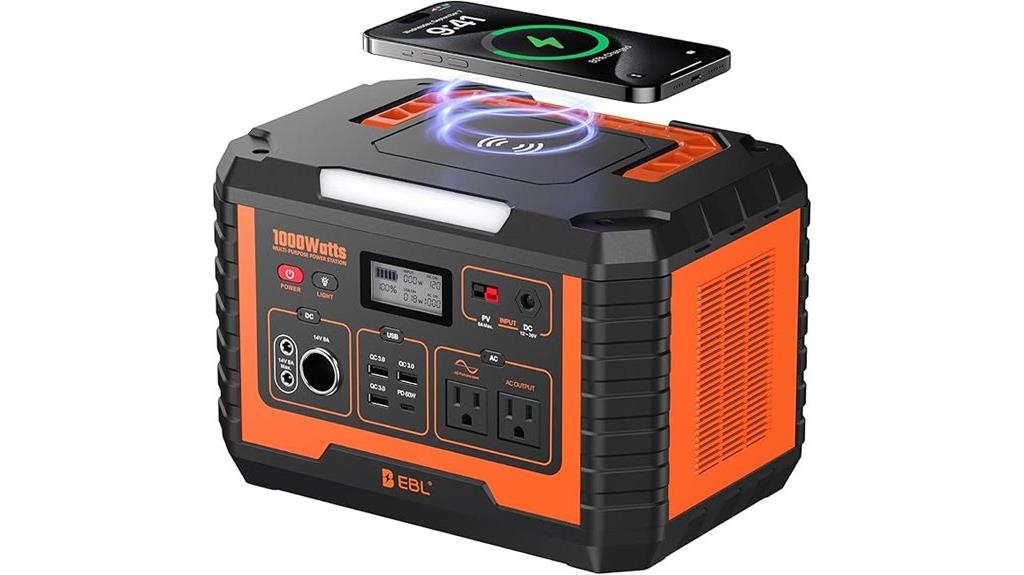
The EBL Portable Power Station 1000W, with a 999Wh capacity, stands out as an ideal choice for outdoor enthusiasts and emergency preparedness, thanks to its high power output and multiple device ports. It can power laptops, mini fridges, projectors, and even electric rice cookers, making it versatile for various needs. With nine ports—including AC outlets, USB-C, USB-A, DC, and a wireless charging pad—it supports multiple devices simultaneously. Its lithium-ion battery supports over 3,000 cycles, ensuring long-term reliability. Weighing just 18.65 lbs and designed for portability, it’s perfect for camping, off-grid living, or backup during outages.
Best For: outdoor enthusiasts, emergency preparedness, and off-grid living who need a reliable, portable power source capable of powering multiple devices simultaneously.
Pros:
- High-capacity 999Wh lithium-ion battery supports extended use and over 3,000 charge cycles.
- Versatile ports including AC outlets, USB-C, USB-A, DC, car socket, and wireless charging pad for multiple device compatibility.
- Lightweight and compact design weighing only 18.65 lbs, making it highly portable for outdoor activities and emergency situations.
Cons:
- Some users have reported battery failure after repeated use, indicating potential long-term durability issues.
- Charging times via solar, car, or AC may take several hours, which could be inconvenient in urgent situations.
- Limited to 1000W continuous power output, which may not support high-power appliances or tools.
Portable Power Station 600W 293Wh
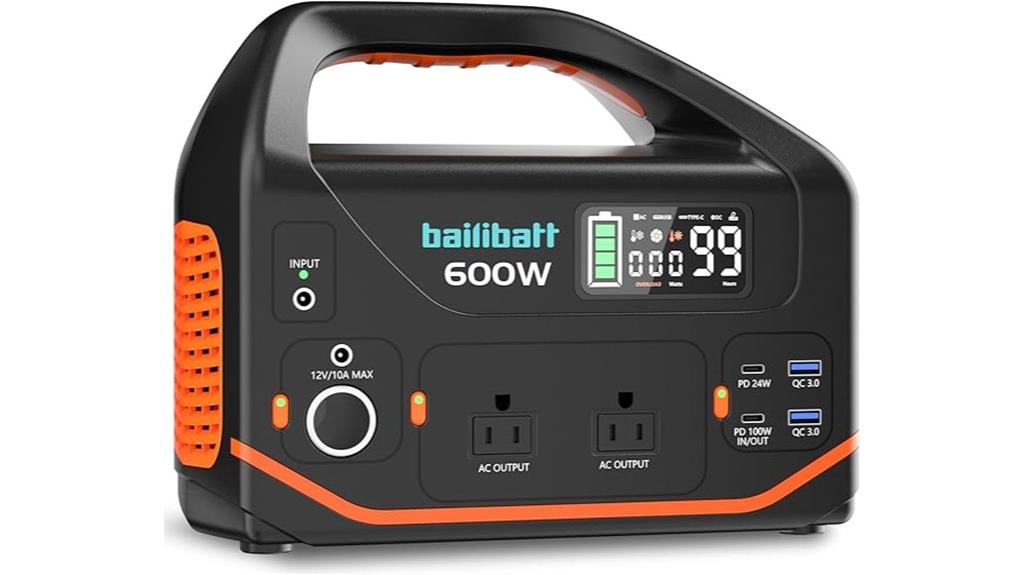
The Portable Power Station 600W 293Wh is an excellent choice for outdoor enthusiasts and emergency preparedness, thanks to its lightweight design and versatile charging options. Weighing just 7.7 pounds with durable ABS construction, it’s easy to carry on camping trips or store for emergencies. It offers a 600W continuous output and multiple ports, including AC, USB-C, fast-charging USB, car, and DC, powering laptops, small appliances, and devices safely with pure sine wave power. The LCD displays real-time info, and its BMS guarantees safety and longevity. Overall, it’s a reliable, portable power solution for various outdoor and backup needs.
Best For: outdoor enthusiasts, campers, and emergency preppers seeking a lightweight, versatile power backup for small appliances and devices.
Pros:
- Compact and lightweight design (7.7 lbs) for easy portability
- Multiple charging options including AC, solar, and car, suitable for various scenarios
- Pure sine wave output ensures safe operation for sensitive electronics
Cons:
- Charging speed with the included AC adapter may be slow
- Limited to a 293Wh capacity, potentially requiring frequent recharges for extended use
- Activation of the AC outlet requires a press-and-hold for three seconds, which may be inconvenient for quick power needs
Anker SOLIX C1000 Portable Power Station

If you’re looking for a portable power station that can reliably run most household appliances and outdoor gear, the Anker SOLIX C1000 is an excellent choice. It features a 1056Wh LiFePO4 battery with a 10-year lifespan and supports 1800W continuous power, peaking at 2400W, enough for most appliances. Its compact design is 15% smaller than comparable units, making it easy to carry. Quick to recharge, it gets to 80% in just 43 minutes with UltraFast technology and can fully recharge in under an hour. Plus, it supports solar recharging up to 600W, perfect for eco-friendly outdoor adventures.
Best For: outdoor enthusiasts, homeowners needing reliable backup power, and travelers seeking portable, eco-friendly energy solutions.
Pros:
- High-capacity 1056Wh LiFePO4 battery with a 10-year lifespan and 3,000 recharge cycles.
- Rapid charging capabilities, reaching 80% in 43 minutes with UltraFast technology.
- Versatile with 11 ports and support for solar recharging up to 600W, suitable for a wide range of devices and outdoor use.
Cons:
- May be heavier than smaller portable power units, potentially affecting portability.
- Requires a smartphone and app for full recharging features, which might be inconvenient for some users.
- Higher initial cost compared to basic portable chargers, reflecting its advanced features and capacity.
Mango Power E Home Backup & Portable Power Station (3.5kWh)

For anyone seeking reliable backup power during outages or off-grid adventures, the Mango Power E Home Backup & Portable Power Station stands out with its impressive 3.5kWh capacity and rapid charging capabilities. Powered by durable CATL LFP batteries with a 10-year warranty, it supports super-fast charging in just 1.5 hours and offers multiple charging options, including solar, grid, and generator. Its expandability allows increasing capacity up to 14kWh by connecting units. Weighing 102 pounds with wheels and handles, it’s designed for portability and heavy-duty use. With 16 outlets, overload protection, and silent operation, it’s a reliable, versatile solution for home backup, outdoor adventures, and off-grid living.
Best For: homeowners, outdoor enthusiasts, and emergency preparedness individuals seeking a reliable, expandable, and fast-charging portable power solution for backup, off-grid, or outdoor use.
Pros:
- Rapid charging in just 1.5 hours with multiple charging options (solar, grid, generator)
- Expandable capacity up to 14kWh by connecting additional units
- Durable CATL LFP batteries with a 10-year warranty ensuring safety and longevity
Cons:
- Heavy weight (102 pounds), making it challenging to move despite wheels and handles
- Small touchscreen display may require bending down for operation
- High upfront cost around $1500 or more, which may be a barrier for some users
Factors to Consider When Choosing a Portable Power Station for Home Backup

When selecting a portable power station for home backup, I focus on understanding my power needs, battery quality, and recharging options. I also consider the types and number of ports, as well as the station’s size and portability. These factors guarantee I choose a reliable, convenient solution that fits my specific requirements.
Power Capacity Needs
Choosing the right portable power station hinges on accurately evaluating your power capacity needs. I start by calculating the total wattage of essential devices I want to run during an outage, ensuring the station can handle their combined load. It’s also important to contemplate the continuous power output, so I can operate critical appliances simultaneously without overload. I keep in mind surge wattage, which is higher than running wattage, to cover startup demands for devices like refrigerators or pumps. Additionally, I evaluate the battery capacity in watt-hours (Wh) or amp-hours (Ah) to make sure it can power my devices for the desired duration. Matching these needs with the power station’s maximum output and battery lifespan guarantees reliable backup performance when I need it most.
Battery Technology & Lifespan
Selecting the right battery technology is essential for guaranteeing your portable power station delivers reliable backup power over the long term. Lithium Iron Phosphate (LiFePO4) batteries are a popular choice because they offer a long cycle life—often over 3,000 to 4,000 charge cycles—meaning they can last more than a decade with proper use. This high cycle count directly correlates with a longer lifespan, reducing the need for frequent replacements. Modern power stations feature advanced Battery Management Systems (BMS) that monitor voltage, current, and temperature to optimize safety and extend battery life. LiFePO4 batteries are also safer, with lower risks of thermal runaway, making them ideal for critical home backup needs. Choosing a station with durable chemistry ensures consistent performance and better long-term value.
Recharging Flexibility Options
Recharging options play a essential role in guaranteeing your portable power station remains reliable during outages or off-grid adventures. I look for stations that support multiple recharging methods like AC wall outlets, solar panels, and car adapters, providing maximum flexibility. Checking the maximum input wattage for each method is critical—higher wattages mean faster recharging, reducing downtime. Advanced features like MPPT solar charge controllers are a plus, as they optimize solar energy capture and boost efficiency. Compatibility with various solar panel wattages and types ensures I can tailor my setup for best recharging. Finally, I consider the device’s recharging cycle life and support for fast charging technologies, which help minimize the time spent recharging and keep my power station ready when I need it most.
Port Selection & Output
When preparing a portable power station for home backup, ensuring it has the right ports and sufficient output capacity is essential for supporting your essential devices. I look for models with enough AC outlets, ideally with a 2400W inverter, to handle high-wattage appliances like refrigerators or heaters. Multiple port options, such as USB-C, USB-A, DC5521, and car charging ports, allow me to charge a variety of devices simultaneously. It’s also imperative that the power station provides pure sine wave output, ensuring safe operation for sensitive electronics like computers and medical devices. I verify the total continuous power capacity and surge wattage to meet peak demands, ensuring the station can handle high-demand appliances without issues. Matching port configurations to my specific backup needs is essential for reliable performance.
Portability & Size
Ever wondered how to choose a portable power station that’s easy to move during an emergency? The key is considering its weight and size. Lighter units under 20 pounds are highly portable and quick to deploy, perfect for sudden outages. Larger models might need wheels or handles to help with mobility. The form factor should fit comfortably in your storage space and be manageable for one or two people to carry. Compact designs are ideal for outdoor use and limited storage areas, but they often have lower power capacities. Striking the right balance between size and power needs is essential—make sure the station isn’t too bulky to carry but still provides enough outlets and capacity for your backup essentials.
Frequently Asked Questions
How Long Do Portable Power Stations Typically Last Under Continuous Use?
When I think about how long portable power stations last under continuous use, I know it varies depending on the model and capacity. Typically, they can run for several hours to over a day on a full charge, especially if you’re powering low-wattage devices. I always recommend checking the watt-hour rating and the device’s power draw to get a better idea of their endurance for your specific needs.
Can Portable Power Stations Power High-Energy Appliances Like Refrigerators?
Did you know that most portable power stations can handle appliances up to 1,500 watts? When it comes to powering high-energy devices like refrigerators, it really depends on the station’s capacity. I’ve found that larger, high-capacity models with pure sine wave inverters can definitely keep a fridge running during an outage. Just make sure to check the wattage of your appliance first to guarantee compatibility and avoid overloads.
What Is the Safety Protocol for Charging Portable Power Stations With Solar Panels?
When charging my portable power station with solar panels, I always follow safety protocols. I make certain to use panels compatible with the power station’s specifications, avoiding overvoltage. I connect everything in a dry, shaded area to prevent electrical hazards. I also monitor the charging process regularly and never leave it unattended. Finally, I follow the manufacturer’s instructions carefully to guarantee safe and efficient charging.
Are Portable Power Stations Environmentally Friendly and Recyclable?
Ever wondered if portable power stations are eco-friendly? I believe they can be, especially since many are designed with recyclable materials and include eco-conscious manufacturing processes. While they do produce some environmental impact, they often help reduce reliance on fossil fuels by harnessing renewable energy sources like solar. Overall, choosing models with recyclable parts and sustainable features makes a positive difference for our planet.
How Do Weather Conditions Affect the Performance of Solar-Powered Stations?
Weather conditions definitely impact solar-powered stations‘ performance. I’ve noticed that bright, sunny days give me the best energy output, while cloudy or rainy weather reduces efficiency. Extreme temperatures, both hot and cold, can also affect battery health and charging speed. It’s important to position the station properly and consider weather patterns in your area to get the most reliable power from your solar setup.
Conclusion
So, which portable power station will you trust to keep your home running smoothly? With options like high-capacity batteries, solar compatibility, and reliable brands, there’s something for everyone. Remember, choosing the right backup power depends on your specific needs and how much you value portability versus capacity. Are you ready to invest in peace of mind and never be left in the dark again? Let’s power up confidently for whatever 2025 throws our way.


